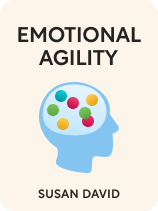

This article is an excerpt from the Shortform book guide to "Emotional Agility" by Susan David. Shortform has the world's best summaries and analyses of books you should be reading.
Like this article? Sign up for a free trial here.
Are feelings experiences or truths? Are emotions connected to personality? How should your emotions about the past be understood differently from what you’re feeling right now?
Susan David explains that most people react instinctively to their perceptions of events. She argues that you can break free of these controlling narratives by practicing emotional agility. She shares recommendations for understanding both your present and past emotions.
Read more to learn how to understand your feelings by being objective about them.
How to Understand Your Feelings
David’s advice on how to understand your feelings is wrapped up in her third step in developing emotional agility: viewing your emotions from an objective perspective. David says that, when you’re able to look at your emotions—and the narratives they come from—from a rational, objective standpoint, you’ll be able to see the flaws in your narrative and in your emotional reactions to it.
For example, if someone cuts you off in traffic, you might feel anger as your brain forms the narrative, “He deliberately cut in front of me!” For the rest of your commute, you brood in your anger. However, if you think about the situation objectively, you’ll realize that the other driver likely wasn’t trying to mistreat you—he simply didn’t see you—and there’s no reason to be so angry.
(Shortform note: Some people may find it more difficult than others to see their emotions objectively. Research shows that people with Major Depressive Disorder have lower activity in the part of the brain responsible for voluntary emotional regulation, and injuries to the frontal lobe can hinder your ability to recognize your emotions.)
Additionally, understanding that your emotions are temporary experiences and not absolute truths about your life helps lessen the power of the narratives you hold about yourself. For example, the fact that you feel sad in reaction to an event doesn’t mean you can’t handle stress or that your situation is hopeless. It only means that, at that moment, you feel sad.
David offers two techniques for gaining an objective perspective: mindfulness for handling your present emotions and journaling for handling your past emotions.
| How Emotions Relate to Personality While David says that your emotions are only temporary and aren’t truths about you and your life, some psychological trait researchers emphasize a link between your personality traits and the emotions you frequently feel. One study describes a link between various emotions (and emotional regulation strategies) and the classic “big five” personality traits: Openness to experience: More curious people tend to be more accepting of their emotions. Conscientiousness: More organized people tend to be more mindful of their emotions. Extraversion: More outgoing people are more likely to experience positive emotions. Agreeableness: More compassionate people are more likely to feel positive emotions toward others. Neuroticism: More nervous people are more likely to experience negative emotions. However, while these traits are useful descriptors, they don’t define you. In Personality Isn’t Permanent, psychologist Benjamin Hardy says your personality changes throughout your life—in response to both major life events and your daily habits and choices. Indeed, studies show that as people grow older, they tend to become more outgoing, organized, and agreeable. |
Understand Present Emotions With Mindfulness
Mindfulness is the act of paying attention to your senses, emotions, and surroundings without judgment. David suggests that, by paying attention to the stimuli in your surroundings—and the emotions that arise from your thoughts about these stimuli—you can weaken your instinct to believe your narratives. Your brain avoids mindfulness to save you mental energy in everyday life: If you can pour a glass of water without paying close attention, you’ll likely do so on autopilot every time you’re thirsty. While on autopilot in this way, you’re more susceptible to your narratives and emotions controlling you.
However, David says you don’t need to be mindful at every moment in order to ward against narrative and emotional control. Instead, pay deliberate attention to your surrounding stimuli from time to time throughout the day. You’ll gradually become more mindful with practice.
Understand Past Emotions With Journaling
Journaling means writing down your experiences, feelings, and thoughts—or narrating them into a voice recorder. Unlike mindfulness, which deals with present emotions, journaling is a technique for processing past emotions and narratives. David says journaling naturally leads you to label and accept your emotions, offering you a more objective understanding of those emotions. Journaling can reduce the power of lifelong emotions and narratives, preparing you to actively choose your responses to emotions in the future.
| Consider The Bullet Journal Method While journaling can be a helpful practice, research suggests that it can easily turn into a form of brooding if you journal about stressful events themselves instead of your emotions related to those events. One journaling method that may be particularly well-suited to enable emotional agility instead of brooding is bullet journaling. In The Bullet Journal Method, Ryder Carroll suggests the following techniques: Write by hand. Writing by hand is usually slower than typing or speaking, so you’re more likely to mindfully pay attention to your emotions and surroundings while writing. Reflect on the past. Carroll encourages you to reflect on past experiences by writing about them daily, considering your feelings and different ways you could have chosen to respond to events. Plan for the future. Regularly revisiting your goals for the future helps you think ahead to what you want to do, and planning your goals far enough in advance allows you to tweak them as you discover what values you want to live by. |

———End of Preview———
Like what you just read? Read the rest of the world's best book summary and analysis of Susan David's "Emotional Agility" at Shortform.
Here's what you'll find in our full Emotional Agility summary:
- Why most people react instinctively rather than objectively
- How to live according to your values to create the life you want
- How to handle your emotions better using mindfulness techniques






